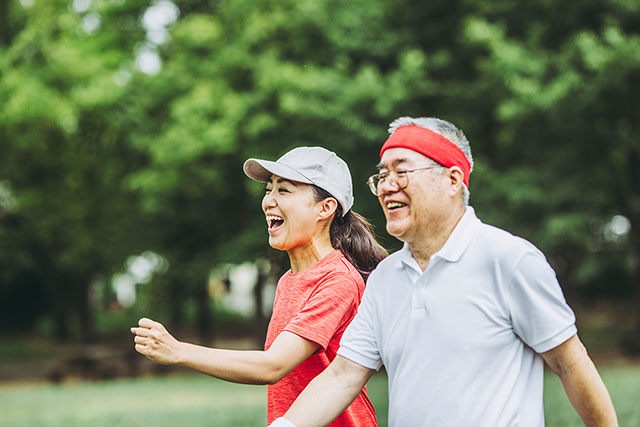Singaporeans live longer than most other nationalities1 but many here are unprepared and unsure of how to manage their rising longevity.
More than half (55 per cent) of the 1,214 Singapore residents surveyed for Prudential’s Ready for 100 research report said they were not ready to live to 100 years of age from a financial or health perspective. Furthermore, only a small number even aspire to live to 100, with less than one-third of survey respondents saying they wanted to live to that age (29 per cent).
These sentiments are at odds with the actual average life expectancy in Singapore which at 84.8 years is currently the highest in the world.
For this rising longevity to be a positive experience, people in Singapore need to build strength in four key areas of life that are known to contribute to the length and quality of one’s years. These are financial stability, work, health and wellness and supportive relationships.
Financial Health
One of the report’s key recommendations is for Singapore’s residents to invest more in their ability to be productive for a longer time to ensure they remain financially self-sufficient even in advanced age. This reduces the risk of them outliving their retirement savings.
Singapore residents are good savers (only 21% say they barely save or don’t save at all) and have strong safety nets in the Central Provident Fund (CPF) and public medical insurance. Even so, this may not be enough to meet their needs to 100. 52% of the respondents said they expect to rely on a salary to support themselves after 62, which is the standard retirement age.
Addressing this challenge requires a full re-imagining of how people work and retire in the future and the part businesses play in helping to extend people’s working lives.
Work
Older Singapore residents seem open to change; 65% of respondents aged 55-64 say they would be able to acquire the necessary skills to stay productive for an extended career.
However, to capture this opportunity, companies must do their part in addressing concerns such as work-life balance and the need for flexible schedules to help older workers sustain their energy, manage home responsibilities and continue developing their careers. Employees too need to be more proactive in actively seeking new challenges, learnings and opportunities in the workplace. Only 4 in 10 say they currently do so.
Health and wellness
Greater efforts are required to protect health, a life asset that is particularly vulnerable to old age. The report found that Singapore residents intend to take good care of themselves but in reality, fall short.
Only 2 in 10 engaged in 150 minutes of physical activity per week as recommended by the Health Promotion Board. They also consumed a considerable amount of processed grains and sugar daily. 73% indicated they eat cookies, cakes and candies daily while 95% consume white rice, noodles or bread daily, increasing their health risk as they age. Such a diet has been linked to old-age illnesses such as dementia, diabetes and heart disease.
Exercising and eating well can help us to live well for longer. On top of that, it is important to prepare for life’s uncertainties with adequate health insurance coverage.
Relationships
The strong intergenerational ties in Singapore’s family-centric society means residents receive the strong support they need as they age. Seventy-five per cent of respondents stated they could rely on their families for support when faced with unpredictable life events. Conversely, such demands put pressure on family-members as well. A quarter of respondents say the stress of care giving hurts their relationships.
Diverse networks can help to lessen the demand on families by providing people with extended communities to help them be supported through the challenges of aging. The government’s 2015 Action Plan for Successful Ageing seeks to create such opportunities for people to age actively in an inclusive community, with the right infrastructure.
About the Ready for 100 in Singapore? Preparing for Longevity report
The study titled Ready for 100 in Singapore? Preparing for Longevity2 report examines the opportunities and challenges that lie ahead for Singapore’s residents, employers, healthcare practitioners and policymakers as people live longer. It is inspired by the book The 100-year life by Lynda Gratton and Andrew Scott.
Researchers surveyed 1,214 respondents in Singapore aged between 25 and 74 in March 2018. The group had an equal representation of men and women.
Several experts on ageing were interviewed for this research. This includes Professor Chan Heng Chee, chairwoman of Lee Kuan Yew Centre for Innovative Cities and ambassador-at-large at the Ministry of Foreign Affairs, Mr Laurence Lien, chairman of the Lien Foundation and Mr Christopher Gee, senior research fellow at the Institute of Policy Studies, lead of the demography and family cluster.
1http://www.bbc.com/travel/story/20170807-living-in-places-where-people-live-the-longest
Disclaimer:
The information in this article does not necessarily reflect the views of Prudential Assurance Company Singapore Pte. Ltd. Certain information in this article may be taken from external sources, which we consider reliable. We do not represent that this information is accurate or complete and should not be relied upon as such.
This article is for your information only and does not consider your specific investment objectives, financial situation or needs. We recommend that you seek advice from a Prudential Singapore Financial Consultant before making a commitment to purchase a policy.
The information contained on this website is intended to be valid in Singapore only and shall not be construed as an offer to sell or solicitation to buy or provision of any insurance product outside Singapore.
Information is correct as at 12/09/2019.
This advertisement has not been reviewed by the Monetary Authority of Singapore.

